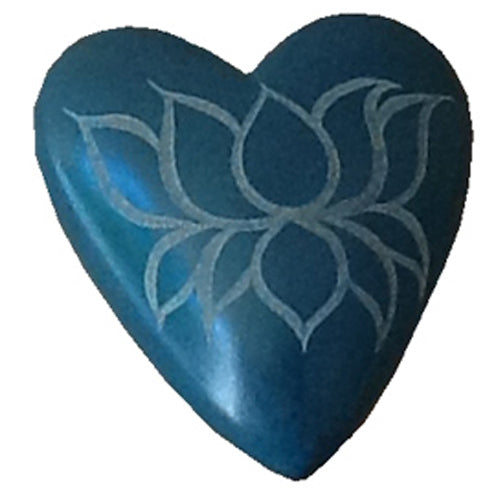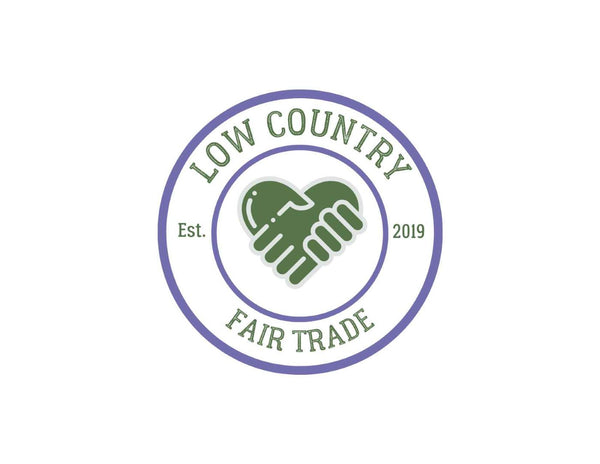OWP
Hand-Carved Soapstone Heart w/ Etched Lotus-Teal-S/M/L Sizes-Fair Trade-Haiti
Hand-Carved Soapstone Heart w/ Etched Lotus-Teal-S/M/L Sizes-Fair Trade-Haiti
No se pudo cargar la disponibilidad de retiro
Help the Haitian People by purchasing these beautiful hearts. They are hand-carved by Haitian Artisans who work very hard-carving, and sanding Kiisi Soapstone to get the perfect designs. Soapstone is found in parts of Haiti where the people wander, searching for the rock surface. These beautiful Lotus-etched hearts come in three sizes; small, medium, and large. We carry 4 other designs in this color (sold separately).
- Small Measures - 1 1/8'' high x 1 1/8'' wide x 1 1/4'' deep
- Medium Measures - 2 3/4'' high x 2 5/8'' wide x 1 1/2'' deep
- Large Measures - 3 3/4'' high x 3 3/8'' wide x 1 1/2'' deep
- Due to the Natural Stone, size and coloring may vary slightly
Handmade in Haiti and fair trade imported.
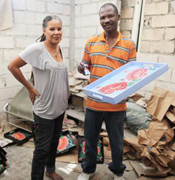 Haiti is often considered the poorest nation in the Western Hemisphere. Haitian artisans live in a country where the political climate and hardships imposed by economic embargos and sanctions in the 1990s have contributed to poverty and accelerated environmental degradation. Health care and education are unobtainable dreams for the impoverished 75-80% majority. The average income is $55. per month. Only 40% of the population has access to potable drinking water and 25% have access to sanitary sewage systems. Infant mortality is over 7%, malnutrition is a common ailment, and almost half of the population is illiterate.
Haiti is often considered the poorest nation in the Western Hemisphere. Haitian artisans live in a country where the political climate and hardships imposed by economic embargos and sanctions in the 1990s have contributed to poverty and accelerated environmental degradation. Health care and education are unobtainable dreams for the impoverished 75-80% majority. The average income is $55. per month. Only 40% of the population has access to potable drinking water and 25% have access to sanitary sewage systems. Infant mortality is over 7%, malnutrition is a common ailment, and almost half of the population is illiterate.
Despite this there is hope. The Artisan Business Network (ABN) empowers Haitians with entrepreneurial tools, design input, and market access. The ABN is making essential improvements, earnings, or artisans, helping them to provide for their families and community well-being through commerce based on Haiti's profound artisanal culture.
To learn more about the Artisan Business Network Community and Fair Trade artisans that make up this network, click on About the Artisans.
Share
About the Artisans
About the Artisans
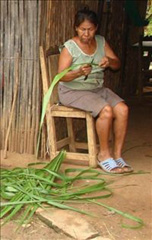 Joyeria Semilla meaning Seed Jewelry is a small fair-trade workshop in the Andean town of Villa de Leyva, Colombia. Girasol Taborda, a local artisan and social entrepreneur, started the workshop in the mid-1990s.
Joyeria Semilla meaning Seed Jewelry is a small fair-trade workshop in the Andean town of Villa de Leyva, Colombia. Girasol Taborda, a local artisan and social entrepreneur, started the workshop in the mid-1990s.
Joyeria Semilla’s objective is three-folds; to create new jobs, revive Colombia's handicrafts sector and to motivate locals to better manage their natural resources. The organization works primarily with socially and economically disadvantaged youths, single mothers and people with disabilities in the area. The company offers free training in product design, technical training and marketing to new members. Joyeria Semilla has trained them in the craft of jewelry-making.
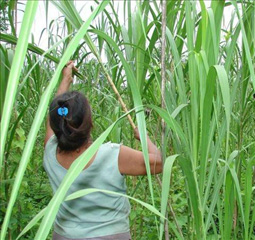
Caña Flecha or “Gynerium Sagittatum” is a locally found palm tree in the regions of the Caribbean coast. The leaves from this plant are used for making jewelry, woven hats, bags and baskets. The Zenú Indians were and their descendants inherited the tradition of picking veins of the green palm leaf for weaving. These veins were made into woven hats and other products for their personal use.
The Zenú culture is said to have existed between 200BC to1600AD. With the arrival of the colonizers in the 16th century, the indigenous community declined of unknown reasons. Today a very small population remains that claims the inheritance of the almost extinct Zenú tribe. Known for their skills in the construction of major waterworks, canals and irrigation system along with being skilled goldsmiths, examples of their accomplished craftsmanship are found in various museums around the world. Their larger means of subsistence were hunting, farming, fishing and trading.
Caña Flecha is found in abundance in the region, and hence makes for a sustainable and naturally available raw material for these products. Every bit of the plant is utilized – from using in building walls and roofs in houses to food for cattle and medicinal purposes. It is from the central vein of the leaf that the fibers for weaving are obtained. After the hard surface is peeled off, the fibers are left in the sun to dry and undergo a natural tinting process; these fibers are barely about 1 millimeter in thickness and hence call for a lot of skill and patience to weave with. The dried fibers are then processed for natural coloration - some are boiled with lemon to whiten them and some are treated with mud and boiled with plantain leaves to blacken them. The designs are based on ancient motifs and mathematical representations, which are inspired by the early Zenú culture.

